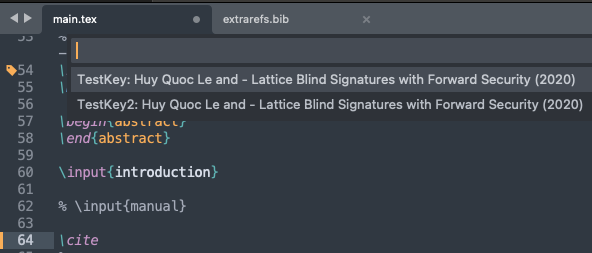The # concatenates strings, so we have "foo" # "bar" = "foobar". It is used very intensively in the third-party provided bibtex files from https://cryptobib.di.ens.fr/ that I am using.
However, I cannot confirm that the issue disappears when the # is removed.
This bibtex file here doesn’t contain the #:
+++ START
@string{acisp20 = “ACISP20”}
@string{acisp20key = “ACISP 2020”}
@string{acisp20name = “ACISP 20”}
@string{acisp20ed = “Joseph K. Liu and Hui Cui”}
@string{acisp20vol = “12248”}
@string{acisp20addr = “”}
@InProceedings{TestKey,
author = “Huy Quoc Le and Dung Hoang Duong and
Willy Susilo and
Ha Thanh Nguyen Tran and
Viet Cuong Trinh and
Josef Pieprzyk and
Thomas Plantard”,
title = “Lattice Blind Signatures with Forward Security”,
pages = “3–22”,
editor = acisp20ed,
booktitle = acisp20name,
volume = acisp20vol,
address = acisp20addr,
publisher = acisppub,
series = mylncs,
year = 2020,
doi = “10.1007/978-3-030-55304-3_1”,
}
@InProceedings{TestKey2,
author = “Huy Quoc Le and
Dung Hoang Duong and
Willy Susilo and
Ha Thanh Nguyen Tran and
Viet Cuong Trinh and
Josef Pieprzyk and
Thomas Plantard”,
title = “Lattice Blind Signatures with Forward Security”,
pages = “3–22”,
editor = acisp20ed,
booktitle = acisp20name,
volume = acisp20vol,
address = acisp20addr,
publisher = acisppub,
series = mylncs,
year = 2020,
doi = “10.1007/978-3-030-55304-3_1”,
}
+++ END
and the issue still appears. Note that the only differences in the two bibtex entries are in the author field and the cite key. Both are displayed until the end of the first line of the author field, as in the screenshot below, therefore I came to the conclusion that it must be due to the line break.





